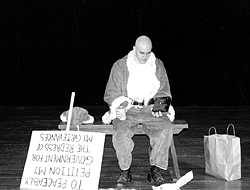

Stephen Sondheim's Assassins is one peculiar show. Its timeline winds unspecifically, it has no particular plot, and the music and lyrics are stranger and less rhythmic than most other Sondheim shows. Like all Sondheim shows, though, it is extremely challenging to stage and time, and director Jacob Hauser, a senior theater major, deserves respect for even attempting such a difficult show.
Granted, the production is rough as it winds its way through the first half. Many of the actors reach with only some success for notes, and they are occasionally hard to hear while singing. The script takes almost the duration of the show to really introduce the characters, most of whom are not introduced by name until the last scene, and it takes almost that long to catch the audience's interest in those characters, most of whom are mentally disturbed to say the least. Charles Guiteau, played by first-year Ex Weiss, for example, is a "glorified narcissist," according to Hauser.

The sets are somewhat bare but certainly adequate; however, this is one of several obstacles caused by the room. Oberlin's various student performing groups really deserve to play in better houses than Wilder Main, which swallows lyrics and sometimes amplifies instruments to the point that they drown out vocalists.
This problem is particularly evident with Assassins because the pit consists of several brass parts, a handful of winds and a few electric instrumentals. Wilder Main also tends to throw off timing between the pit and the actors, but music director Randy Cohen, a senior piano performance major with Broadway credits, keeps the group together throughout. In general the pit and the players are a talented group; still, the show drags at first, mostly because of the book.
The show's first burst of vigor comes with the appearance of five lively bystanders, and once these five exit the energy level drops again. The show picks up again the moment first-year Sarah Wolfman-Robichaud and senior Rebecca Garcia appear (as Sarah Jane Moore and Squeaky Fromme, respectively). The two have wonderful energy individually and as a pair.
Later in the show, Sam Byck, who college junior Arthur Simon plays with infectious, bittersweet intensity, develops as perhaps the first character the audience identifies with. First-year Patrick Mulryan is heartrending as quiet, passionate John Hinckley, and the other actors are fine in their roles.
Despite the problems with the production and with the material itself, though, Assassins must be seen and heard. Once the theme is finally introduced, the show grips attention by understanding what all human beings want and need and by acknowledging that society doesn't provide it. "No one listens," the assassins lament, unified in song across barriers of time, space, language and life. They band together in the end to prove to the most famous assassin in American history that "someone wants to hear about your day."
The assassins contend that "the mass of men lead lives of quiet desperation" and that in committing such an offense as "killing a Prez" they have raised their lives to lives of noted desperation. After all, no one today would have heard of a particular nineteenth-century actor if he hadn't assassinated Abraham Lincoln. College junior Ben Grubb, as John Wilkes Booth, is absolutely compelling as he encourages his fellow assassins to make statements and to fulfill some sort of dream.
Assassins points out that human beings need to be noticed and though of by other human beings. As Booth quotes from Arthur Miller's Death of a Salesman referring to all the unnoticed Willy Lomans of the world, "Attention must be paid."
Assassins shows tonight and Saturday at 8 p.m. in Wilder Main, Saturday and Sunday at 2 p.m. Admission is $3 OCID, $5 others. Admission is $1 more at the door.
Copyright © 1997, The Oberlin Review.
Volume 126, Number 9, November 14, 1997
Contact us with your comments and suggestions.